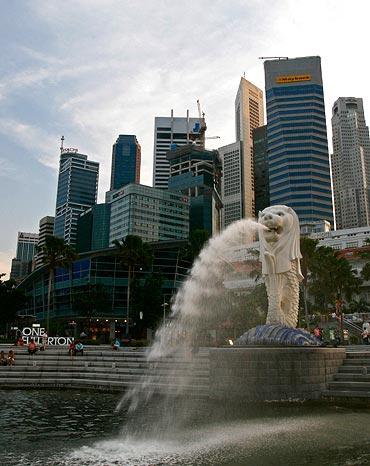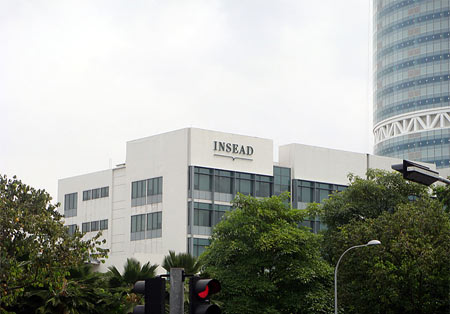Photographs: Alywin Chew/Reuters
The presence of globally ranked institutions like INSEAD and National University of Singapore is one of the many reasons that make Singapore a promising destination for international students to study in the country, says Suchitra Surve, counsellor, EGE Global Education.
Singapore is a multi-ethnic and multi-religious society.
The vibrant mix of ethnic and religious groups offers international students a wide choice for studying and living in Singapore.
Most educational institutions in Singapore offer an adequate range of services to students right from counselling, options for accommodation , advice and orientation programmes -- all of which ensure that the student feels right at home.
Singapore's low crime rates and high standards of living also work to the merit of students thus offering them a conducive environment for study.
With institutions like INSEAD and National University of Singapore finding its place in the top 10 of the QS World MBA rankings, the country is growing as a popular destination to study among international students across the globe.
Besides, post-education, the career opportunities available for students are equally prospective in nature which explains why most students continue to stay and work after they complete their education.
Most educational institutions cater to a wide range of interests, from sports and recreation to cultural and other activities.
In some educational institutions, students are even encouraged to form clubs of their own and handle its employment activities.
The cost of living and tuitions fees in Singapore are lower than in the UK or US.
In addition to local universities, many of the world's top foreign universities have also established their presence in Singapore.
They have either set up a campus (institutes of higher learning) or have joint collaborations or programmes with local universities.
Singapore is becoming an increasingly popular destination for Indian professionals as there is an increase in demand for overseas labour from the financial services and banking industries.
Also Read: What attracts Indian students to Singapore Universities
Click NEXT to continue reading
Education system in Singapore
Singapore's world-renowned education system caters to every student's need and helps them optimise their potential to the fullest.
Colleges and institutions around the world find Singapore's education system as being one of the best in the world.
In Singapore, international students have the opportunity to achieve academic excellence and also be a part of a global community.
The government of Singapore is doing its best to promote its various higher secondary colleges and institutions across Indian metros and other large cities to increase its international presence.
Over three years, the number of Indian students opting for studies in Singapore has gone up significantly. One of the reasons being that more Indian families are comfortable taking up jobs in Singapore so that they can offer quality education to their kids as they grow up.
With its development to a knowledge-based economy, Singapore's education is being seen as a positive step towards achieving success in recent years.
With an internationally acclaimed education system and a modern multi-ethnic environment, students can definitely look forward to enjoying a truly satisfying and fulfilling educational and cultural experience in Singapore.
Illustration: Uttam Ghosh
Admission requirements
International students will have to appear for TOEFL/IELTS and prove their English language proficiency.
Depending on the school and programmes they are applying for, SAT/ GRE /GMAT may be applicable for undergraduate, Master's and Doctoral degree programmes.
Undergraduate: For pursuing a Bachelors degree, students should provide their undergraduate passing certificate.
Masters: To begin a postgraduate course in the Singapore, you'll need to hold a graduate degree from a recognised University.
Admission Intakes
The two main intakes for government universities are Fall (August-Sept) and Spring (January).
Private educational organisations have multiple intakes (Jan/ Feb/July/Aug/Sep/Oct/etc).
International students mainly choose the Fall intake because many universities open up for admission with more number of seats and mainstream courses.
So, if an international student wishes to apply for Singapore universities they should generally look for his/her desired programme to study, the course intake and accordingly apply to universities so that they don't miss the deadlines. Besides admission processes of most of the Singaporean universities are competitive.
Illustration: Uttam Ghosh
Cost of education in Singapore
For undergraduate programs the fees varies from institute to institute between S$ 6,500-8,500 per year and for postgraduate programs the fees ranges from S$ 7,500-9,500 per year.
The standard of living in Singapore is amongst the highest in Asia.
Compared to countries in western continents, the cost of living in Singapore is relatively low, and basic items like food and clothing are very reasonably priced.
An international student in Singapore spends on average about S$700 to S$2,000 a month on living expenses.
Scholarships
Majority of the universities in Singapore awards scholarships through Research Assistantship/Teaching Assistantship.
Recipients will be assigned research or teaching duties within the University.
RA/TA awards are changed annually depending on the student's academic and work performance as well as funding availability.
The Dr Goh Keng Swee (GKS) Scholarship is a private scholarship set up by the Singapore financial community and is administered by the Association of Banks in Singapore.
Each year, 3 to 4 scholarships are awarded to outstanding individuals from the Asia-Pacific regions to pursue undergraduate studies in Singapore Universities.
Illustration: Dominic Xavier
Accomodation in Singapore
Students should make prior arrangements for accommodation before arrival in Singapore.
Temporary accommodation can be arranged before a student leave home, giving time to plan your living arrangements when you arrive.
Most educational institutions have an International Student Office specialising in the needs of international students.
The staffs at these centres offer advice on accommodation procedures, contacts for private rental offers, room-mate services and so on.
Halls/Residence (within campus) are available between S$200 to S$450 approx per mth
You can also opt for alternative housing (outside campus) for anything between S$350 to S$1,000.
The International Student Services (ISS) of the Office of Student Affairs provides assistance to all foreign students in the University. It takes care of the following
- Orientation programmes
- Provide details and offer guidance on student's pass and application
- Hosting family programmes
- Provide information on cultural and recreational events happening in Singapore
- Support through international student services
Leading universities in Singapore
Image: INSEAD, SingaporePhotographs: Wikimedia Commons
- National University of Singapore(NUS)
- Nanyang Technological University (NTU)
- Singapore Management University(SMU)
Infact, INSEAD, Singapore was ranked number 1 in the QS global MBA rankings 2012.







Comment
article